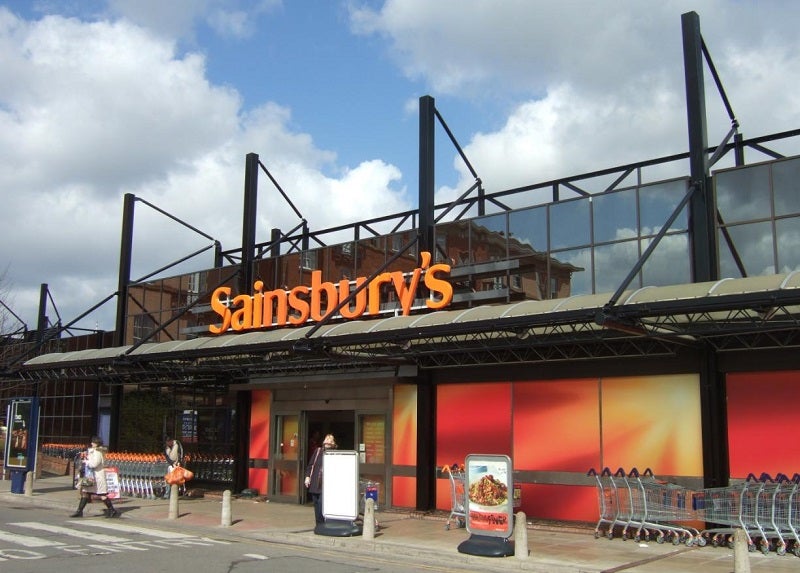
UK supermarket chain Sainsbury’s has said its strategy will focus on core business investments and net debt reduction following the release of its preliminary results for the 52 weeks to 9 March 2019.
The results also reveal that the supermarket spent £46m on its failed attempt to merge with Asda.
Group sales grew by 2.1% to £32.4bn and underlying profit before tax increased by 7.8% to £635m. Net debt reduced by £222m to £1,636m, and post-tax profit declined 29.1% to £219m. Basic earnings per share declined to 9.1p from 13.3p.
Sainsbury’s CEO Mike Coupe said: “I am pleased to report that we have increased profits, reduced net debt and increased the dividend. This is testament to the hard work of colleagues across the business and I would like to thank them for their commitment during this year of change.
“We completed the integration of Argos that we set out in 2016, delivering £160 million in synergies ahead of schedule. We completed a major transformation of how we run Sainsbury’s stores and have made significant improvements to store standards in recent months, which remain a focus. Customers continue to rate us top for quality food and we are growing our premium ranges. We are also focused on reducing costs so that we can invest to make commodity products better value for our customers.”
Coupe continued: “We will increase and accelerate investment in the core business, investing to improve over 400 supermarkets this year. £4.7 billion of our revenue now comes from our online businesses and we are increasing investment in technology to make shopping across Sainsbury’s, Argos and Sainsbury’s Bank as quick and convenient as possible. We will also continue to strengthen our balance sheet and are making a new commitment to reduce net debt by at least £600 million over the next three years.

US Tariffs are shifting - will you react or anticipate?
Don’t let policy changes catch you off guard. Stay proactive with real-time data and expert analysis.
By GlobalData“I am confident in our strategy and also clear on what we need to do to continue to evolve the business in a highly competitive market where shopping habits continue to change.”
GlobalData retail analyst Thomas Brereton said: “Sainsbury’s has had an undeniably testing year. As well as the CMA blocking its attempt to merge with ASDA, under-par store standards and a lack of instore availability have been widely acknowledged and have contributed to an inadequate Group LFL sales growth of -0.2%.
“So even though it is often difficult to choose a winner from the Big Four supermarkets, Sainsbury’s has incontestably claimed the bottom spot for the past 12 months, continuing to exhibit inexcusable weaknesses on a day-to-day operational level that its competitors (particularly a reinvigorated Tesco) have taken full advantage of.”
Analysts praise store advancements and urge Sainsbury’s strategy to focus on customer traction
Brereton continued: “Putting the meagre sales numbers briefly to one side, Sainsbury’s appears to now be one of the more ‘future-ready’ UK grocers. It has followed up its impressively outside-the-box ‘department supermarket’ format in Birmingham Selly Oak in October, with the opening of a new Scan and Go convenience store trial to the London public earlier this week.
“Furthermore, it has also developed its store network decisively, selling 12 of its superstores to a US-based real estate investment trust to focus on its faster-growing convenience sector, while concurrently upgraded parts of its home delivery fleet to electric vans as part of its commitment to reduce carbon emissions by 30% by 2020. With respect to innovation and readying the business for the long-term, Sainsbury’s seems not only competitive but arguably market-leading.
“But promises of long-term gains do little to soothe worries over short-term difficulties. Speculation of an imminent change in leadership is well-founded; the combination with ASDA was a bold, laudable risk by Mike Coupe, but following its failure, Sainsbury’s must now do something drastic to demonstrate that it can now stand up and dust itself off.
“Sainsbury’s has laid out its beliefs that differentiation through quality is the key to future success, and securing exclusive, distinctive products to fill its shelves – a praiseworthy tactic to haul itself out of the overly-competitive mid-market. But shoppers are fickle and Sainsbury’s will now struggle to recall those that are now happily shopping at Tesco, the discounters, or the premium players; Sainsbury’s has lost out to them all during the period, and the aftershock of a lengthy period of mismanagement will likely continue to reverberate at a store level until Sainsbury’s can prove to customers it has refreshed itself for the better,” concluded Brereton.
See the Sainsbury’s full-year 2018/2019 results in full here.



